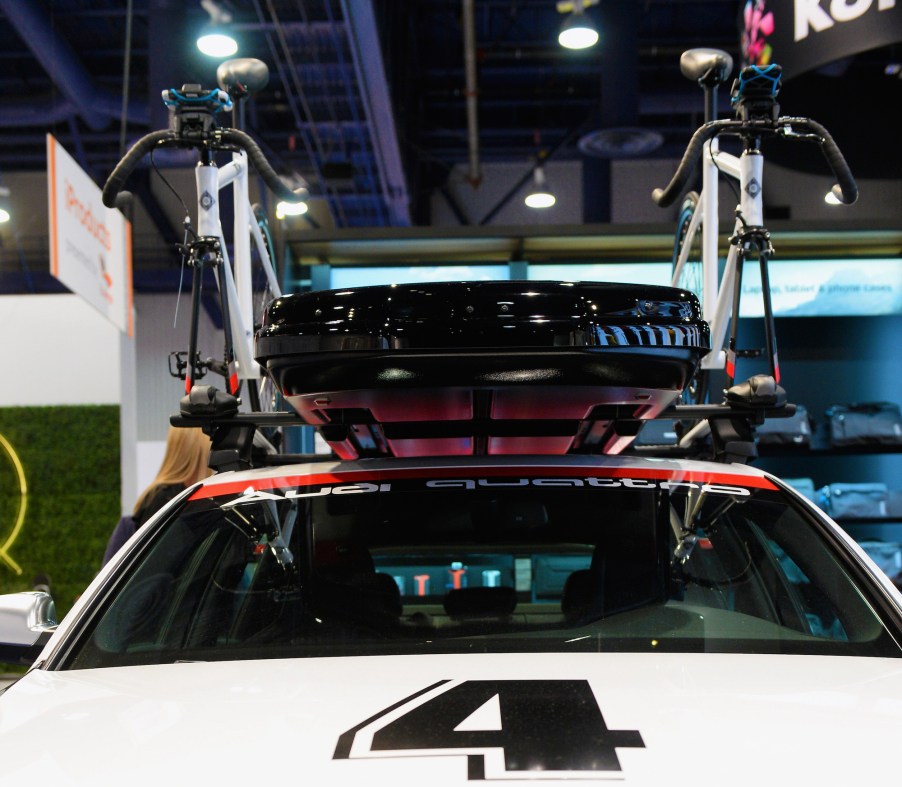
Thule vs. Yakima: Which Makes the Better Car Racks?
If you’re in the market for new accessories for your vehicle, specifically a base rack, bike rack, or cargo box, there’s never been more choices. But the wide range of products can make choosing one difficult. So we’ve made it easier by narrowing the options to two popular travel storage makers: Thule and Yakima.
Which one makes the better car racks? We’ve researched materials, structure, and price points to help you decide.
Thule and Yakima: Leaders in travel storage
Thule is a Swedish company that’s been around since 1942. It believes in powering passion, helping outdoor enthusiasts, and allowing families to stay active, Thule says. You’ll find bike racks, roof racks, cargo carriers and baskets, winter and water sport racks, and more. Thule specializes in artistic vision and design.
Yakima began in 1979 as a small machine shop. Over the years, the company has relocated, expanded products, and significantly grown. Most recently, Yakima teamed up with Toyota as an official sponsor for Toyota’s outdoor event team. Products include all kinds of truck and roof racks, cargo baskets and boxes, rooftop tents and accessories, and more. Yakima specializes in affordability and durability.
Below, we pick which company we think makes the better product in each of three categories: crossbars, bike racks, and cargo baskets.
Crossbars: Yakima
Crossbars are the basis for any roof rack system because they act as a foundation for how racks are attached.
Yakima kills the competition with the Flushbar. It retails for about $250 and can completely blend in with your car’s design, Kayamping reports. It’s strong yet quiet, reducing noise to almost nothing. It weighs only four pounds, which is important because some systems can weigh down a car and negatively affect fuel economy. And it comes with a lifetime warranty.
Thule also has a couple of good crossbars in the Evo Wingbar and AeroBlade Edge. These crossbars, too, are excellent noise reducers. Plus, they’re durable and easy to install. However, the Evo Wingbar costs $440, and the AeroBlade Edge retails for nearly $500. The Wingbar also doesn’t blend as seamlessly as Yakima’s Flushbar, which offers a better warranty than Thule’s products.
Bike racks: Yakima
Bike racks are common car accessories. Roof racks are great because you can easily adjust them for different wheel sizes and fit a wide range of bikes.
Yakima has an edge in roof bike racks because they’re the company’s main focus. Two excellent products are HighRoad and HighSpeed. Both can fit one bike, are a universal roof rack fit, and feature a torque right knob. HighRoad costs $249, while HighSpeed runs $239.
Comparatively, Thule offers TopRide and FastRide. TopRide retails for about $240. And though it’s a great product, it’s not as adaptable as Yakima’s HighRoad. To fit various bikes, you’d have to buy separate adapters. TopRide is easy to install, but it doesn’t fit as many vehicles and doesn’t come with a lifetime warranty like the HighRoad.
Cargo baskets: Thule
Rooftop baskets are where Thule really shines. These products give you extra cargo space so that you can hold all kinds of equipment. Your vehicle is ready for a cargo basket once it has a crossbar.
Thule’s Canyon XT is a stylish roof basket that’s also highly functional and versatile. It can hold up to 150 pounds, and it weighs only 29 pounds. You can even extend the cargo space by adding an accessory. Wind fairing helps reduce the cargo basket’s road noise and improves fuel efficiency. The Canyon XT retails for about $350.
Yakima offers a wide variety of cargo baskets, but they’re pretty basic. You’ll find some under $200, but they have no defining features or interesting designs. They’ll hold up well and do the job, but they’re a bit of an eyesore. In this case, the Canyon XT would be worth the extra $150 or so for something attractive atop your vehicle.


